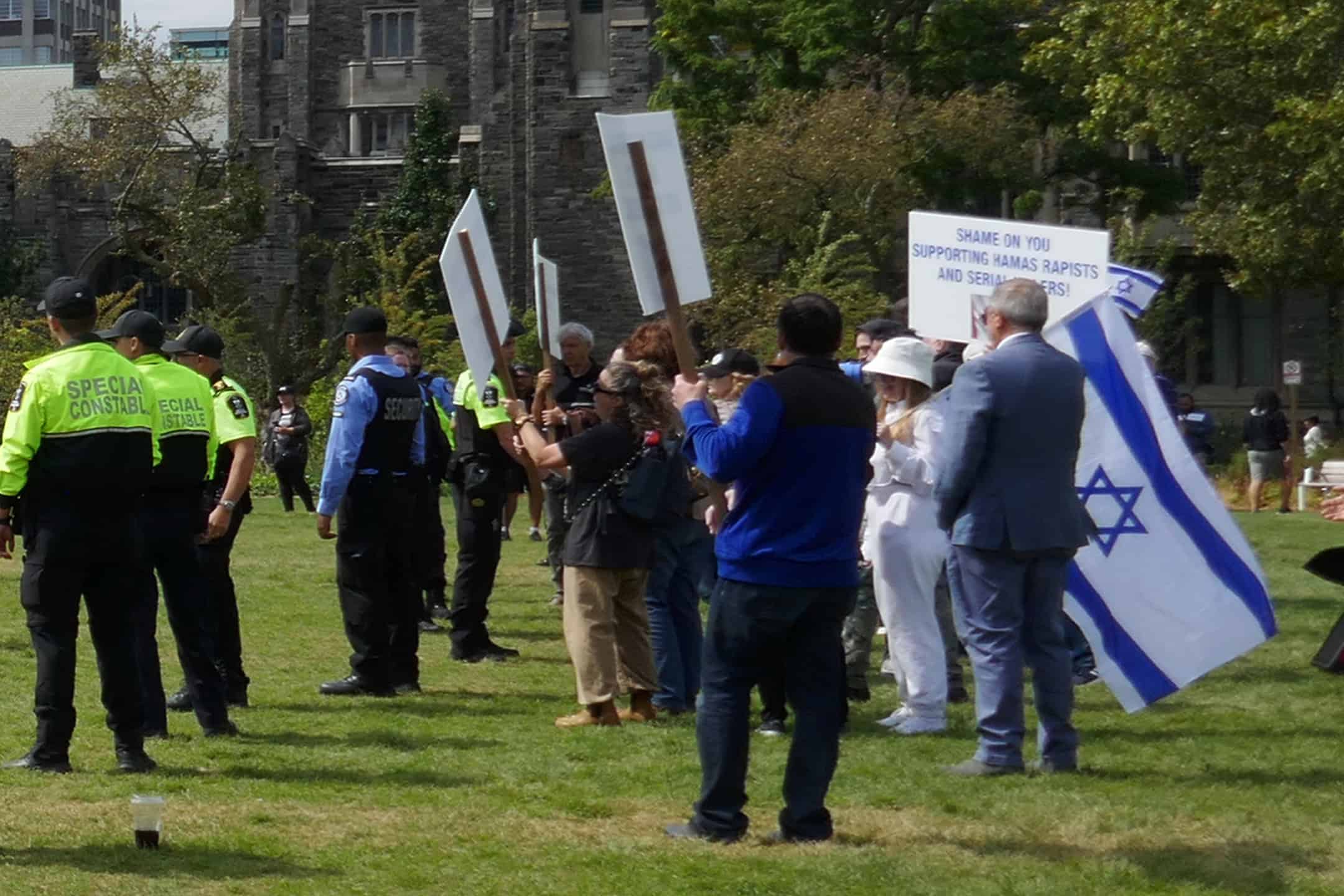Content warning: This article discusses Islamophobia, anti-Palestinian racism, anti-Arab racism, and antisemitism.
On September 6, far-right agitators confronted pro-Palestine student protesters at King’s College Circle. Among these agitators was Meir Weinstein, the former leader of the Jewish Defense League (JDL) — whose American branch was designated as a terrorist group by the FBI. Members of the JDL have been convicted of multiple bombings and an attempt to hijack a plane.
At the same confrontation, the far-right protesters openly displayed violent and dehumanizing slogans such as “Make Gaza a parking lot.” They also hurled racist and Islamophobic slurs, and yelled “Get out of Canada. This is our country.” Ron Banerjee, a notorious Islamophobe, led the chants. Furthermore, these extremist agitators unfurled flags of Kahane Chai, a Jewish entity that advocates for expelling Arabs from Israel, and is a far-right terrorist group as designated by Canada.
Other vigilantes from JForce, a private security firm and self-described “defenders of Israel,” roamed the campus in groups dressed in black uniforms and tactical vests. Meanwhile, Magen Herut — an extremist group based in Canada — was also spotted on campus, creating an intimidating atmosphere for Muslim students.
As the President of the Muslim Students’ Association (MSA), it is clear to me that the U of T administration has failed to protect its Muslim and Arab students, along with their peers and allies. To me, this failure demonstrates an indifference to these students’ safety and reveals institutional biases.
Extremism on the rise
These right-wing protesters are not just agitators — they are connected to extremist organizations with histories of violent extremism.
Weinstein runs an organization, Israel Now, that promotes physical confrontations with pro-Palestinian supporters and spreads anti-Muslim hate. Despite being banned from York University after a violent altercation with students in 2019, he continues to be allowed at U of T.
Additionally, Magen Herut publicly advocates for Israeli expansion and Jewish indigeneity in the land.
The right-wing extremist protesters’ display of the Kahanist flag is a clear attempt to intimidate Muslim and Arab students. Waving the flag of a terror group should result in arrest followed by swift condemnation. But in the university’s case, the agitators displayed the flag with campus police present and no action was taken.
This growing wave of Islamophobia and anti-Arab violence is reflected in the rest of North America. In the past year, a man murdered a six-year-old Palestinian-American boy in Illinois, and another man ambushed and shot three Palestinian college students in Vermont. Additionally, far-right counter-protestors attacked peaceful pro-Palestinian student protestors at the University of California, Los Angeles.
In Canada, during October 2023, there was a 1,300 per cent surge in Islamophobic incidents, including attacks on mosques and against visibly Muslim individuals — particularly women who wear the hijab.
Safety for all?
Despite our repeated requests to take Muslim students’ concerns seriously, the administration remained silent for weeks after far-right groups were on campus in September. It was only on October 3 that the administration responded privately to us in an email that “free speech laws” of the school’s policy on freedom of speech protect individuals’ opinions even if they are “controversial or unpopular.”
After over a month of further pressuring the administration, MSA executives escalated the situation to U of T’s Vice-President, People Strategy, Equity & Culture Kelly Hannah-Moffat and Vice-President and Provost Trevor Young. On November 5, the senior administration finally privately conceded to the MSA over email that the incident was indeed Islamophobic and included anti-Palestinian discrimination.
But sadly, the university has already fuelled dangerous rhetoric and misinformation. When students organized the King’s College Circle encampment to protest the university’s potential complicity in Israel’s genocide of Palestinians — the subject of investigations by the International Court of Justice — U of T responded by characterizing the encampment as hateful and violent, which I see aligning with the racist trope that Muslims and Arabs are inherently antisemitic.
Yet, I saw that the encampment included members of diverse backgrounds, including Muslim, Jewish, and Indigenous students, staff, and faculty. And, despite a court ruling that the protest was peaceful and not antisemitic, the university still did not retract its false inflammatory claims.
Actions speak louder
Contrasted with how the administration treats Muslim and Arab students and their allies, I see it acting swiftly when Zionist Jewish students express concerns.
For example, the university quickly cut ties with former Muslim chaplain Imam Omar Patel for allegedly posting antisemitic social media posts that were attributed to him, despite inconsistencies suggesting the screenshots may have been manipulated. Yet, when a teaching staff member of the Governing Council, Professor Ramy Elitzur, compared Jewish pro-Palestinian protestors to Nazis, the university took no action.
In September, President Meric Gertler delivered remarks about antisemitism on campus, where he invoked the university’s shared responsibility to ensure all students are free from “discrimination or harassment.” However, given the university’s repeated neglect of Muslim students’ concerns, the administration’s selective concern is glaring.
The MSA’s internal polling at the end of September revealed that 80 per cent of 242 respondents stated that they feel unsafe or somewhat unsafe on campus. A staggering 96 per cent felt that the administration has not addressed their concerns regarding student safety.
We urge the university administration to handle the safety of all student groups equally and, at minimum, take immediate action. Acknowledgements and apologies are not enough.
The university must officially ban dangerous individuals, such as Weinstein and Banerjee, from campus permanently to show that the administration takes student safety seriously. Furthermore, after five years of communicating with the administration, the university must follow through with its promises to launch a functional working group to address Islamophobia, anti-Arab, and anti-Palestinian racism on campus.
This working group is crucial to addressing the harm caused by the administration’s neglect and to begin the long path to repairing broken trust.
Mohamad Yassin is a second-year master’s student studying electrical engineering. He is the president of the Muslim Students’ Association.


